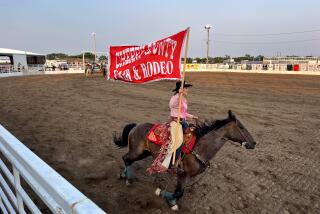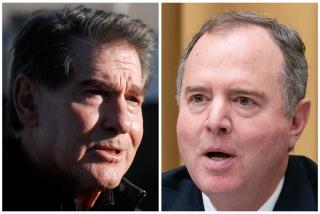In S. Dakota, a Hot Seat for Senate
- Share via
SIOUX FALLS, S.D. — States don’t get much more barren or remote than South Dakota. Cattle outnumber people. Its capital is so isolated that no interstate highway goes there.
Yet sleepy South Dakota finds itself thrust squarely onto the front lines of this year’s clash for control of the Senate. Indeed, as both national parties marshal forces here, the state’s Senate race has emerged as perhaps the fiercest battle in the 2002 campaign.
Some analysts predict more money will be spent per vote in South Dakota than on any Senate campaign ever. And with election day still more than seven months away, many voters already are combat weary.
“It’s going to be a long year,” said Harley Christensen, a retiree in the farm community of Viborg.
The designated political gladiators are Sen. Tim Johnson, the Democrat seeking reelection, and Rep. John R. Thune, the Republican trying to unseat him.
But the combatants are being egged on by the nation’s top leaders: President Bush, who recruited Thune to run, and Senate Majority Leader Tom Daschle, the state’s senior senator, who has made reelection of his Democratic colleague a priority.
The stakes are as vast as the state’s sprawling farmland. The outcome could determine not only which party controls the Senate but also what Congress does with Bush’s agenda and whether Daschle remains majority leader.
All of this has brought big names to small towns. Bush’s chief political advisor, Karl Rove, and several other top administration officials have stumped for Thune. Daschle is practically Johnson’s running mate--a view crystallized when Mary Niedringhaus, a local supporter, introduced Johnson at a recent campaign event: “We can win with Tom and Tim!”
The contest also offers one of the last glimpses of a campaign finance system that ends after 2002 as a result of the reform bill that cleared Congress last week. The measure, which Bush has pledged to sign, abolishes “soft money”: unlimited donations to national parties. These funds have helped finance the early, intensive ad war here.
But South Dakota provides a lesson in the limits of the impending campaign law.
Much of the advertising that has clogged the airwaves here--and irritated voters--would not be prohibited. The ads crackling across television sets have been paid for not just by the parties but also by outside interest groups. Such ads would be limited, but not ended, by the campaign finance measure.
There still would be no limit to what TV stations can charge for ads and, more important, what campaigns can spend. Higher levels of so-called “hard money” donations could be collected, and there would be no public financing of campaigns.
Although the national stakes in South Dakota are sky high, the local dynamics are remarkably parochial. South Dakotans seem to want their candidates to talk more about preserving meatpacking plants and controlling prairie dogs than about political ideology. And they don’t need ads to be introduced to the candidates, whom many know on a first-name basis.
One risk to both sides is that if the disparity between local concerns and national themes is too great, voters will feel alienated from the whole process. The deluge of advertising, most of which has focused on national issues, has already caused at least a few South Dakotans to tune out.
“My wife says she is never going to vote again,” said Phil Olsen, a retired construction worker from Centerville.
In a letter to her local newspaper, Barbara J. Peterson of Sioux Falls wrote: “Since the Winter Olympics are over, one of my friends has decided to put her television in a closet until after election day.”
Politics is personal in South Dakota because the electorate is so small. With a population of only 750,000, South Dakota has 33.2 million fewer residents than California--spread over 75,952 square miles.
One reason the political air war is raging is that it is so cheap to advertise here. Running an ad statewide for a week costs about $80,000 in South Dakota; in Los Angeles, it costs about $1.5 million.
The Senate battle has national import because Democrats control the chamber by only one seat. If the Senate flips Republican--and the GOP retains its House majority--it would be far easier for Bush to guide his agenda through Congress.
Daschle also would be demoted to Senate minority leader--and lose a big chunk of the power that has positioned him as a possible presidential candidate in 2004.
Republicans see Johnson, a freshman, as a top target because this heavily Republican state elected him in 1996 with only 51% of the vote. And Thune is a strong challenger; as the state’s sole House member, he is well known statewide.
Johnson is trying to focus voters on one key question: Who can deliver for South Dakota? He touts his position on the money-dispensing Appropriations Committee, and his ads spotlight constituent service and the project funding he has brought home.
That kind of clout counts for a lot in a state such as South Dakota, where people fear their interests will be swamped in Washington by California and other more populous states. Politics in such a small state is also about personality, and even Johnson supporters concede that Thune is helped by his lanky good looks and smooth style.
“Thune has the Reagan image,” said Tom Lemonds, a Johnson supporter from Brandon.
Thune is trying to portray Johnson as out of touch with the state. GOP ads criticize the incumbent for opposing Bush’s recent economic stimulus plan and the administration’s missile defense plan.
Democrats respond that Johnson was one of 12 Democrats in the Senate to support Bush’s big tax cut last year. And when his credentials as a supporter of the military are questioned, they note that his son is in the armed forces in Afghanistan.
Both candidates agree on one thing: They don’t think their race should be viewed as a proxy war between Daschle and Bush.
“It comes down to Tim Johnson and John Thune, and our ability to reflect the interests and values of the state,” Johnson said.
Thune, however, might not even be running for the Senate if not for Bush. He had been expected to run for governor but Bush urged him to take on the Senate race instead, wooing him over dinner at the White House last year.
After Thune agreed, Rove came here for a fund-raiser. Others who have trekked to the state for him include Commerce Secretary Don Evans and Education Secretary Rod Paige. Thune expects Bush himself to visit at least once before election day, and he emphasizes the importance of having a South Dakotan in the Senate who is on the president’s good side.
“The ability of the president to advance his agenda is going to depend on his having a Congress willing to work with him and not against him,” Thune told supporters at a recent luncheon in Vermillion, Johnson’s hometown.
Johnson, meanwhile, makes much of his ties to Daschle. The two joined forces for a four-day campaign tour last month. Johnson argues that together they give the state clout in Congress it has never had.
“With Tom as majority leader and my seat on the Appropriations Committee, it gives us an opportunity to do some things we were never able to do before,” Johnson told a crowd at a pancake breakfast in Brandon.
Some Republicans are trying to turn Johnson’s association with Daschle into a liability. They see Daschle’s new role as Bush’s No. 1 Democratic opponent as potentially perilous in a state where the president is hugely popular.
Daschle is not up for reelection until 2004, but he has been targeted in some of the ubiquitous television ads. One was financed by the conservative Club for Growth, whose president, Steve Moore, acknowledged that part of his aim is to inflict collateral damage on Johnson.
“The best way to hurt Tom Daschle politically this year is to help elect John Thune,” Moore said.
It’s not clear that this tactic will work, because Daschle remains immensely popular back home. Thune is careful to avoid criticizing him, and his ads underscore his ability to work with Daschle.
With many voters irritated by the ad barrage, Thune has urged Johnson to accept a ban on advertising by outside groups. The idea foundered, in part, on Johnson’s insistence that the ban also apply to ads against Daschle.
Thune has asked outside groups who support him to refrain from advertising on his behalf. But few think the request will be honored.
Said Moore, “There’s no way you are going to stop outside money from coming into that state.”
Even if the much-touted campaign finance bill were in effect today, analysts say, the scene in South Dakota might not look much different. Aside from the efforts of outside interest groups, many of the current ads are paid for by the candidates and would be unaffected by the measure’s ban on soft money donations to the parties.
Also, the law’s ban on ads by outside interests 30 days before a primary and 60 days before the general election would have no effect at this stage of the South Dakota race. And the law may enhance rather than inhibit the role of groups such as Club for Growth: People who might have given soft money to the political parties may give instead to such groups.
“If there is a supply of soft dollars, [groups] are going to find a way to spend it,” said Moore. “This bill doesn’t plug that leak.”
More to Read
Sign up for Essential California
The most important California stories and recommendations in your inbox every morning.
You may occasionally receive promotional content from the Los Angeles Times.














